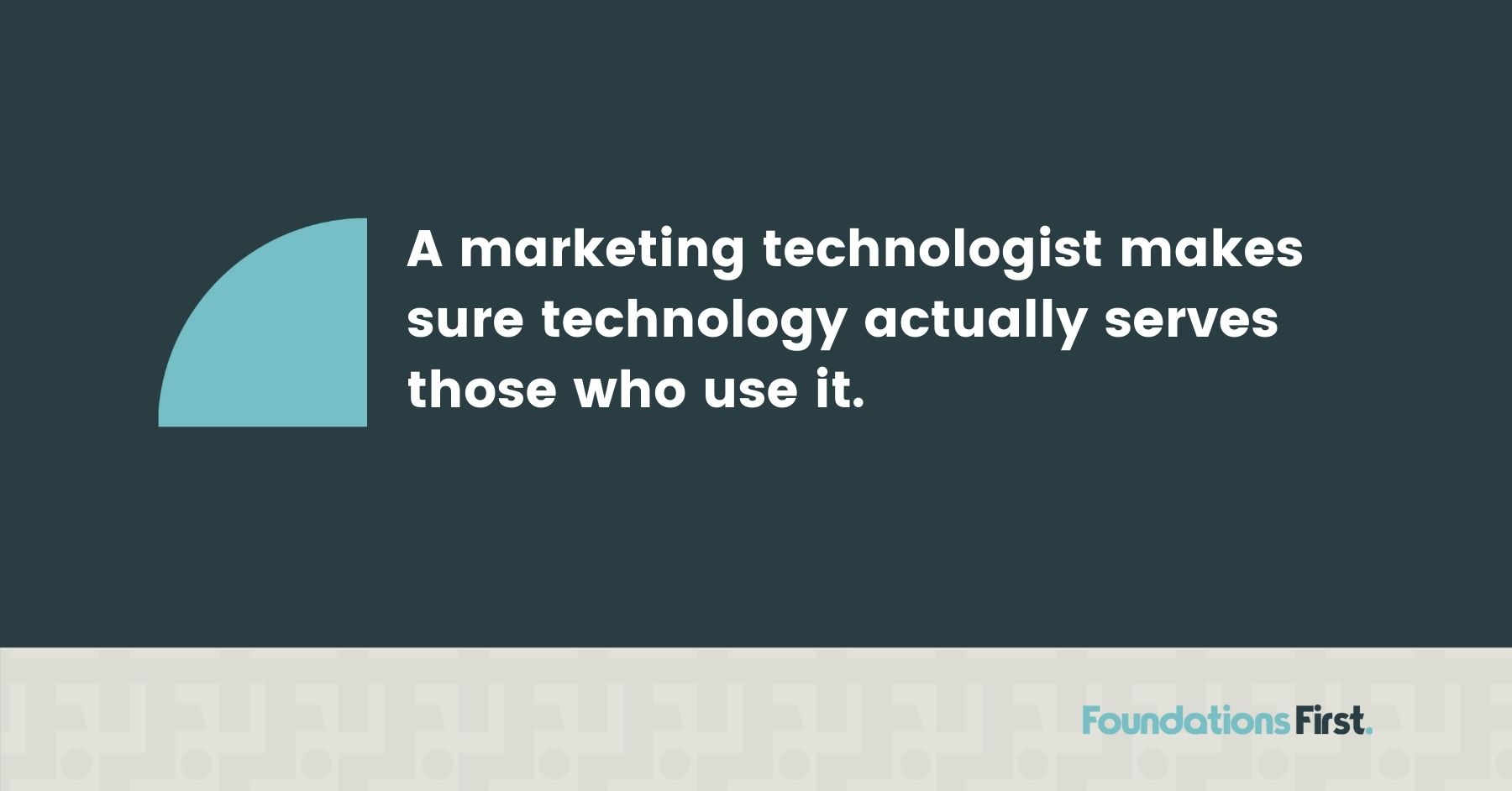Today a colleague of mine and I daydreamed about how we’d build a killer marketing team. We gave ourselves 5 FTEs to work with. We debated back on forth on who to include on this dream team. In the end, we both agreed on an unlikely position. We want a marketing technologist.
What’s a Marketing Technologist?
A marketing technologist is a hybrid. Think of a love child of an IT pro and a marketer–heavy on the IT pro. These pros handle “tech that tracks, triggers, schedules, segments, automates, optimizes and reports things.” In short, they keep up with ever-changing marketing tech stacks. They make sure those are properly set up and function the way they’re supposed to. Their presence makes sure that technology actually serves those who use it. Meanwhile, the rest of the marketing team can focus on what they’re great at–reaching the right people with the right message.
The Paradox of Technical Competence
I’ve worked with marketing departments as small as 1 FTE and as large as 20. Almost without exception, those staffs struggled to keep up with the high degree of tech competence their jobs required. And doing so often distracted them from their greater missions.
Communications managers, for example, are wired to work with other human beings. They build relationships. Yet companies seek someone who can not only create a great press release, but also be able to set up and track parameters on the URL links. Why? Because you need those in order to measure clicks!
Likewise, we expect lead generation managers to come up with cutting edge ideas. Their brilliance is in their ability to capture the attention of their ideal target. Yet we also expect they’ll be able to stay up to date on GDPR, CCPA, CASL, and other privacy laws. If you don’t, your cookies won’t be in compliance.
We’re to the point that we demand today’s marketers have quick solutions in their pockets for every channel and function. Tech should make marketing more efficient. Yet for marketing staff, even simple processes take more and more technical skill. The hard truth is that we’re burning out marketers. Burnout causes inefficiency. The system is bat shit broken. And it needs a rethinking.
The Problem with Modern Marketing and Digital Marketing Technology
1. Technologies are in constant flux.
Over the past 10 years, the pace of new marketing technologies has left us breathless. Older technologies like Google (22 years old) and Facebook (16 years old) are little more than young adults. And like young adults, they’re in a constant state of change. Keeping up with how to best leverage these technical marvels is a full-time task. Yet do businesses invest in professional development to keep up with these changes? Not often enough!
2. Expectations for entry-level positions are unrealistic.
What I have seen are ridiculous job descriptions for entry-level positions. These expect college grads to transform overnight from content consumers (with their Facebook, TikTok, and YouTube habits) to content producers. Somehow they are supposed to magically learn how to strategize, create, design, and measure content. Watching YouTube doesn’t qualify you to shoot, edit, and publish videos. That takes knowhow, practice, and usually means making a lot of mistakes. In short, it takes experience.
I bring this up to reset expectations. Just because you grew up with an iPhone doesn’t mean you’re qualified to code apps. If you’re a senior marketing leader, please stop thinking it does.
3. Training doesn’t keep up with technical changes.
All marketers have to be quick learners. But in the area of digital technology, this is not a one and done endeavor. Integrations change, laws change, UI and UX change, and many times for the better. Companies need to do a better job of teaching, nurturing, and retraining staff. They need to provide the time and opportunity for learning. That’s the only sane way to keep up with the constant barrage of new bells and whistles.
How a Marketing Technologist Can Save the Day
1. A marketing technologist lets specialists actually specialize.
If you’re a communications manager there is no way you also have time to know all the tech pieces. If you specialize in crafting compelling lead generation campaigns, you hardly have time to babysit your marketing automation system. Let alone relearn it every time there’s an update.
Why not treat marketing tech like we treat IT? Not everyone needs to know how the computer is built or how secure your intranet is. You have specialists for that. IT allows workers to focus on their own specialties as they keep systems functioning.
A marketing technologist could do the same. Let a specialist live and breathe the tech part of marketing so the communications manager can focus on communicating. And the lead generation manager can focus on generating leads–not spend precious hours figuring out the latest WordPress update.
2. How a company benefits from a marketing technologist.
A marketing technologist frees up a ton of emotional bandwidth expended on tech tasks. The best part is there are people (yes, like me) who absolutely love the tech side of marketing. By adding this position, everyone can operate in their area of unique brilliance.
Watch your team’s efficiency skyrocket. See more smiles from everyone. Find out how much easier it is to fill a social media manager position when you don’t have to require “5 years of work experience on enterprise-class marketing automation systems!” Seriously. Rather than chase after a unicorn that is part techie and communicator, you can hire someone who is wired to truly engage with other people!
A marketing technologist is a jack-of-all-trades in the digital world. They are skilled at everything from web development to social media marketing tactics and everything in between. They can free up time and stress from other staff. Add one to your staff and watch the creativity flow!
Meet the Marketing Dream Team
Back to the original daydream. If I were to build my marketing dream team with 5 positions, this is how I would build it:
Marketing Director
- Keep everyone motivated and moving in the same direction
- Budget allocation
- Reports up to C-Suite
- Works with product and sales teams for cross-departmental alignment (timing for product launches, feature releases, etc.)
Lead Generation and Customer Retention Manager
- Builds campaigns to drive leads
- Builds retention campaigns
- Steward of the entire customer lifecycle
Community, Communications, and PR Manager
- Handles internal and external communications
- Organizes events (conferences, speaking events, webinars)
- Handles social media comments and posting
- Builds relationships with media outlets and influencers
- This position is the voice of the company
Marketing Technologist
- Supports all positions above
- Maintains CRM data integrity
- Codes and sends all email campaigns
- Codes blog posts as well as optimizes for SEO
- Builds and optimizes the website and landing pages
- Maintains all user accounts for security
- Manages SEO of all content added to the website
- Monitors and reports analytics for all campaigns
Graphics and Multimedia Specialist
- Supports all positions above
- Creates graphics and videos for social media, web pages, infographics, ebooks, and white papers
- Edits video from events and handles video production
Imagine what it would be like to never have to worry about “tech crap” ever again in your marketing campaigns. Or imagine not laying out the expense of having to hire a developer every time you need a new landing page template.
Expectations and Staffing are Foundational Issues
Let’s talk about how to create your own dream team.
This dream rant comes from watching clients struggle to keep up with the digital end of things. And I know most small B2B companies don’t have the budget for a 5-person dream team. Even so, a deep dive into your vision and marketing assets inevitably brings up staffing and resource allocation. Talent is one of those resources.
We can help you better assess and develop your foundational skill set. The good news is that many companies already possess the talent for a dream team. We can nerd out with you to help you rethink how to nurture, train, and refocus that talent. We’d love to talk more about how you can craft your own dream team. Schedule a no-BS, no-pressure consult today.










